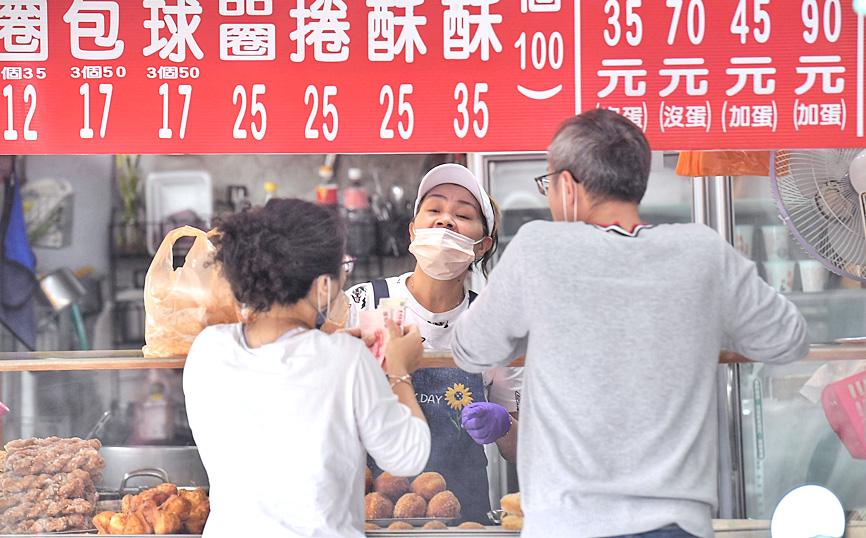Confidence in the local economy weakened due to geopolitical concerns surrounding Russia’s invasion of Ukraine, and a rate hike cycle launched by the world’s major central banks, a survey by Cathay Financial Holdings Co (國泰金控) showed on Wednesday.
The survey of 19,590 Cathay Life Insurance Co (國泰人壽) and Cathay United Bank (國泰世華銀行) clients conducted from April 1 to 7 showed that 46.4 percent of respondents believed the local economic situation would deteriorate over the next six months, while 29.9 percent thought it would improve.
The economic optimism index for the next six months stands at minus-16.5 this month, down from minus-1.7 from last month.

Photo: CNA
The optimism index for the current economic climate also moved lower to minus-16 this month from minus-0.2 last month, the survey showed.
Cathay Financial said that Russia’s invasion of Ukraine, which began on Feb. 24, has created uncertainty in the global economy.
Decisions by central banks to tighten monetary policies and retrieve funds from markets had also cast a shadow.
The war in Ukraine has resulted in sanctions being imposed against Moscow, a move that has sent ripples through global agricultural and commodity markets, adding upward pressure to inflation, Cathay Financial said.
The US Federal Reserve last month announced the first of several expected rate hikes by raising its key interest rate by 25 basis points, and hinted at six further increases to follow, with 50 basis points proposed for its meeting next month.
Taiwan’s central bank followed the Fed by raising interest rates by 25 basis points last month, its first increase in more than 10 years.
Cathay Financial said that a spike in domestically transmitted COVID-19 cases had additionally dampened consumers’ willingness to spend, leading to a fall in confidence in the local economy in this month’s survey.
As a result, the index gauging willingness to purchase big-ticket items, such as vehicles, fell sharply to zero from 10.8 last month.
The index assessing the willingness to buy property also dropped from minus-46 to minus-52.1, its lowest since May 2019, reflecting the effect of the central bank’s rate hike.
The employment optimism index for the next six months fell to minus-15.8 from minus-4.9 last month, while the index gauging the state of the job market also moved lower to minus-12.1 from minus-6.1.
The downbeat sentiment spread to the stock market, with the optimism index for share prices falling to 2.9 from 8.1, while the index gauging investors’ willingness to take risks also dropped to 12.0 from 15.0.
The latest survey found that respondents estimated Taiwan’s economic growth would hit 3.3 percent this year, down from 3.36 in last month’s survey, with 81 percent expecting economic growth of 2 percent or higher.
In the survey, 27.7 percent of respondents were concerned that growing global inflationary pressure would undermine demand and hurt Taiwan’s export-oriented economy, while 22.1 percent expressed concern that an increase in local COVID-19 cases would slow economic growth.

Mercuries Life Insurance Co (三商美邦人壽) shares surged to a seven-month high this week after local media reported that E.Sun Financial Holding Co (玉山金控) had outbid CTBC Financial Holding Co (中信金控) in the financially strained insurer’s ongoing sale process. Shares of the mid-sized life insurer climbed 5.8 percent this week to NT$6.72, extending a nearly 18 percent rally over the past month, as investors bet on the likelihood of an impending takeover. The final round of bidding closed on Thursday, marking a critical step in the 32-year-old insurer’s search for a buyer after years of struggling to meet capital adequacy requirements. Local media reports

AI BOOST: Although Taiwan’s reliance on Chinese rare earth elements is limited, it could face indirect impacts from supply issues and price volatility, an economist said DBS Bank Ltd (星展銀行) has sharply raised its forecast for Taiwan’s economic growth this year to 5.6 percent, citing stronger-than-expected exports and investment linked to artificial intelligence (AI), as it said that the current momentum could peak soon. The acceleration of the global AI race has fueled a surge in Taiwan’s AI-related capital spending and exports of information and communications technology (ICT) products, which have been key drivers of growth this year. “We have revised our GDP forecast for Taiwan upward to 5.6 percent from 4 percent, an upgrade that mainly reflects stronger-than-expected AI-related exports and investment in the third

TECHNOLOGICAL RIVALRY: The artificial intelligence chip competition among multiple players would likely intensify over the next two years, a Quanta official said Quanta Computer Inc (廣達), which makes servers and laptops on a contract basis, yesterday said its shipments of artificial intelligence (AI) servers powered by Nvidia Corp’s GB300 chips have increased steadily since last month, should surpass those of the GB200 models this quarter. The production of GB300 servers has gone much more smoothly than that of the GB200, with shipments projected to increase sharply next month, Quanta executive vice president Mike Yang (楊麒令) said on the sidelines of a technology forum in Taipei. While orders for GB200 servers gradually decrease, the production transition between the two server models has been

US sports leagues rushed to get in on the multi-billion US dollar bonanza of legalized betting, but the arrest of an National Basketball Association (NBA) coach and player in two sprawling US federal investigations show the potential cost of partnering with the gambling industry. Portland Trail Blazers coach Chauncey Billups, a former Detroit Pistons star and an NBA Hall of Famer, was arrested for his alleged role in rigged illegal poker games that prosecutors say were tied to Mafia crime families. Miami Heat guard Terry Rozier was charged with manipulating his play for the benefit of bettors and former NBA player and